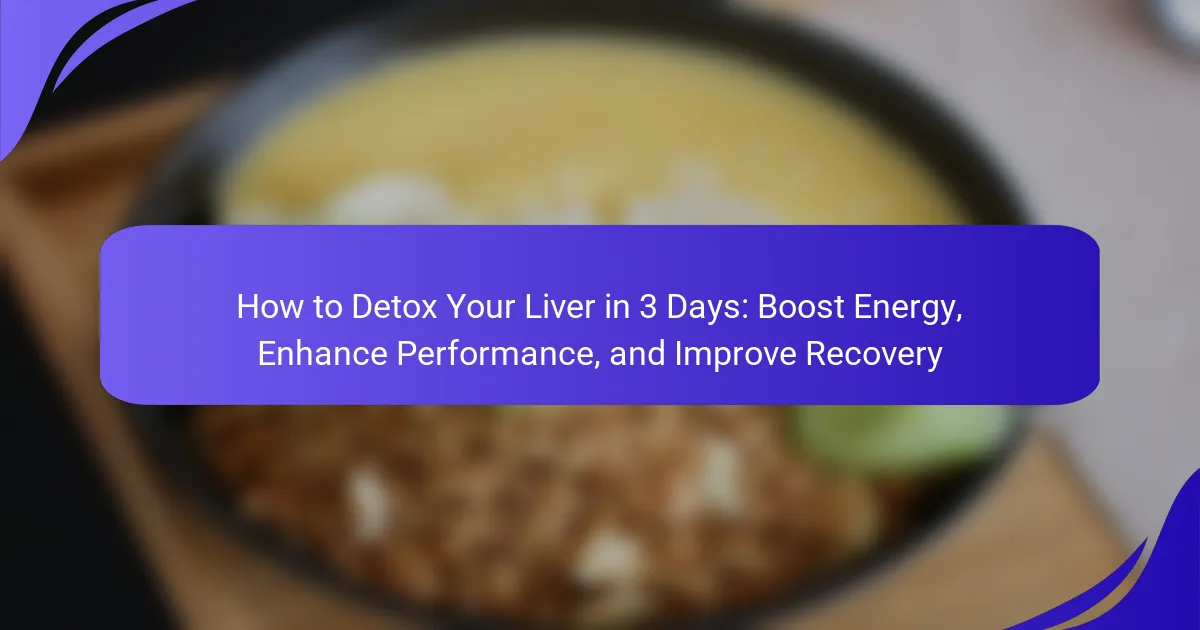Nutrition is crucial for enhancing energy, building muscle, and improving performance in men. A balanced diet with adequate protein, healthy fats, and essential vitamins is key. Prioritising whole foods, staying hydrated, and avoiding common dietary mistakes can optimise health outcomes. Additionally, incorporating unique strategies like intermittent fasting and nutrient timing can further boost performance.

How Does Nutrition Impact Men’s Health?
Nutrition significantly impacts men’s health by enhancing energy levels, promoting muscle growth, and improving overall performance. A balanced diet rich in protein, healthy fats, and essential vitamins supports these benefits. For instance, adequate protein intake is crucial for muscle repair and growth, while healthy fats provide sustained energy. Additionally, micronutrients like zinc and magnesium play vital roles in hormone regulation and physical performance. Prioritising whole foods over processed options can lead to better health outcomes.
What Are the Essential Nutrients for Energy?
Essential nutrients for energy include carbohydrates, proteins, and fats. Carbohydrates are the primary energy source, providing quick fuel for workouts. Proteins support muscle repair and growth, essential for building muscle. Fats offer long-lasting energy and are crucial for hormone production. Including a balanced intake of these nutrients enhances overall performance and energy levels.
How Can Proper Nutrition Support Muscle Growth?
Proper nutrition significantly enhances muscle growth by providing essential nutrients and energy. Key macronutrients include proteins, carbohydrates, and healthy fats. Proteins are vital for muscle repair and growth, with a recommended intake of 1.6 to 2.2 grams per kilogram of body weight. Carbohydrates fuel workouts, while healthy fats support hormone production.
Hydration is crucial, as water aids nutrient transport and muscle function. Micronutrients like vitamins and minerals also play a role in muscle recovery and performance. Consuming a balanced diet rich in whole foods, lean proteins, and healthy fats optimises muscle growth and overall health.
What Role Does Nutrition Play in Athletic Performance?
Nutrition significantly enhances athletic performance by providing energy, supporting muscle growth, and improving recovery. Proper intake of macronutrients like carbohydrates, proteins, and fats fuels workouts and optimises performance. For example, carbohydrates serve as the primary energy source during high-intensity activities, while proteins aid in muscle repair and growth. Hydration also plays a critical role, as even mild dehydration can impair physical performance. Athletes should focus on nutrient timing, consuming meals and snacks that align with training schedules to maximise energy levels and recovery.

What Are the Universal Dietary Guidelines for Men?
The universal dietary guidelines for men emphasise balanced nutrition to enhance energy, muscle growth, and performance. Key recommendations include consuming adequate protein, prioritising whole grains, incorporating healthy fats, and ensuring a variety of fruits and vegetables.
Protein intake should be around 1.6 to 2.2 grams per kilogram of body weight to support muscle synthesis. Whole grains provide essential carbohydrates for energy, while healthy fats, such as those from avocados and nuts, contribute to overall health. Aim for at least five servings of fruits and vegetables daily to ensure sufficient vitamins and minerals.
Hydration is crucial, with a recommendation of about 3.7 litres of total water intake daily. Regular meals and snacks help maintain energy levels throughout the day. Monitoring portion sizes and being mindful of added sugars can further enhance dietary quality.
What Should a Balanced Meal Plan Include?
A balanced meal plan should include a variety of whole foods rich in nutrients. Key components are lean proteins, whole grains, healthy fats, fruits, and vegetables.
Lean proteins like chicken, fish, and legumes support muscle growth and repair. Whole grains such as brown rice and quinoa provide sustained energy. Healthy fats from sources like avocados and nuts promote heart health. Fruits and vegetables supply essential vitamins and minerals, enhancing overall wellness.
For optimal performance, aim for a meal composition of 40% carbohydrates, 30% protein, and 30% fats. This ratio supports energy levels and muscle recovery. Regularly incorporating these elements can significantly boost men’s health and athletic performance.
How Much Protein Do Men Need for Optimal Health?
Men need approximately 56 grams of protein daily for optimal health. This intake supports muscle synthesis, energy levels, and overall performance. Active men may require more, around 1.2 to 2.0 grams of protein per kilogram of body weight. Protein sources include lean meats, dairy, legumes, and nuts. Consuming protein evenly across meals enhances muscle recovery and growth.
What Are the Best Sources of Healthy Fats?
The best sources of healthy fats include avocados, nuts, seeds, olive oil, fatty fish, and coconut oil. These fats support heart health, enhance nutrient absorption, and provide sustained energy.
Avocados are rich in monounsaturated fats and fibre, promoting cardiovascular health. Nuts, such as almonds and walnuts, offer omega-3 fatty acids and antioxidants. Seeds, like chia and flaxseeds, are excellent sources of plant-based omega-3s and fibre.
Olive oil, particularly extra virgin, is linked to reduced inflammation and improved heart health. Fatty fish, including salmon and mackerel, provide high levels of omega-3s, essential for brain function. Coconut oil contains medium-chain triglycerides, which may boost metabolism and energy levels.
Incorporating these sources can enhance overall nutrition and support men’s health goals, such as building muscle and improving performance.

What Unique Nutritional Needs Do Active Men Have?
Active men have unique nutritional needs to support energy, muscle growth, and performance. They require higher protein intake, approximately 1.2 to 2.0 grams per kilogram of body weight, to promote muscle repair and growth. Additionally, complex carbohydrates are essential for sustained energy, with a focus on whole grains, fruits, and vegetables. Healthy fats, particularly omega-3 fatty acids, play a crucial role in reducing inflammation and supporting heart health. Hydration is vital, as active men lose significant fluids during exercise, necessitating increased water intake. Lastly, micronutrients like vitamins D and B12 are important for overall health and energy metabolism.
How Can Men Tailor Their Diet for Specific Fitness Goals?
Men can tailor their diet for fitness goals by focusing on macronutrient balance, meal timing, and hydration. To boost energy, prioritise complex carbohydrates, lean proteins, and healthy fats. For muscle building, increase protein intake to 1.6-2.2 grams per kilogram of body weight. Timing meals around workouts enhances performance and recovery. Staying hydrated optimises physical function and energy levels.
What Are the Best Supplements for Energy and Muscle Building?
The best supplements for energy and muscle building include protein powder, creatine, branched-chain amino acids (BCAAs), and beta-alanine. Protein powder aids muscle repair and growth, while creatine enhances strength and energy during workouts. BCAAs help reduce muscle soreness and fatigue, and beta-alanine improves endurance. Each supplement serves unique attributes that support energy and muscle development effectively.
How Can Men Optimize Their Nutrition During Training?
To optimise nutrition during training, men should focus on balanced macronutrient intake, hydration, and meal timing. Prioritise protein for muscle repair, carbohydrates for energy, and healthy fats for overall health.
Consuming 1.6 to 2.2 grams of protein per kilogram of body weight daily can enhance muscle growth. Incorporate complex carbohydrates like whole grains and vegetables to sustain energy levels. Hydration is crucial; aim for at least 3 litres of water daily, adjusting for activity levels.
Meal timing also plays a significant role. Eating a protein-rich meal or snack within 30 minutes post-workout aids recovery. Consider nutrient timing strategies, such as consuming carbohydrates before and after workouts to maximise performance and recovery.
Lastly, monitor micronutrient intake, particularly vitamins and minerals that support metabolic functions. A diverse diet rich in fruits, vegetables, and whole foods can help meet these needs effectively.

What Rare Nutritional Strategies Can Enhance Performance?
Incorporating rare nutritional strategies can significantly enhance performance. Consider intermittent fasting, which may improve insulin sensitivity and promote fat oxidation. Another strategy is the inclusion of adaptogens, such as ashwagandha, which can reduce stress and boost endurance. Additionally, utilising nutrient timing—consuming specific nutrients at strategic times—can optimise muscle recovery and energy levels. Lastly, exploring microdosing with certain supplements, like creatine, can provide subtle yet impactful performance benefits.
What Are the Benefits of Intermittent Fasting for Men?
Intermittent fasting offers several benefits for men, including improved metabolic health, enhanced fat loss, and increased muscle retention. Research indicates that it can boost human growth hormone levels, promoting muscle growth and fat loss. Additionally, it may improve insulin sensitivity, reducing the risk of type 2 diabetes. Intermittent fasting can also enhance mental clarity and focus, which contributes to better performance in physical activities.
How Can Men Use Nutrient Timing for Better Results?
Nutrient timing can enhance men’s health by strategically consuming nutrients around workouts. Prioritise carbohydrates and protein intake before and after exercise to maximise energy and muscle recovery. For example, consuming a protein-rich meal within 30 minutes post-workout can significantly improve muscle synthesis. Additionally, timing meals to align with workout schedules can optimise performance and endurance. Aim for a balanced intake of macronutrients throughout the day to support overall energy levels and health.
What Are the Emerging Trends in Men’s Nutrition?
Emerging trends in men’s nutrition focus on plant-based diets, personalised nutrition, and functional foods. These trends aim to enhance energy, muscle growth, and overall performance.
Plant-based diets are gaining popularity due to their health benefits and sustainability. Research shows that men adopting these diets often experience improved cardiovascular health and reduced inflammation.
Personalised nutrition, driven by advancements in technology, allows men to tailor their diets based on individual needs. This approach can optimise nutrient intake and support specific fitness goals.
Functional foods, enriched with probiotics, omega-3 fatty acids, and antioxidants, are increasingly incorporated into men’s diets. These foods can enhance performance and recovery, making them a valuable addition to nutrition strategies.

What Common Mistakes Should Men Avoid in Their Nutrition?
Men should avoid common mistakes in their nutrition to enhance energy, muscle growth, and performance. Key mistakes include neglecting protein intake, skipping meals, consuming excessive processed foods, and failing to hydrate adequately.
Neglecting protein intake can hinder muscle recovery and growth, as protein is essential for repair and development. Skipping meals often leads to overeating later, disrupting metabolism. Consuming excessive processed foods, high in sugars and unhealthy fats, can negatively impact overall health and energy levels. Failing to hydrate adequately can impair physical performance and cognitive function.
By addressing these mistakes, men can optimise their nutrition for better health outcomes.
How Can Men Identify and Overcome Nutritional Deficiencies?
Men can identify and overcome nutritional deficiencies by assessing their diet and monitoring symptoms. Regular blood tests can reveal specific deficiencies, such as low iron or vitamin D levels. To address these deficiencies, men should focus on nutrient-dense foods like lean proteins, whole grains, fruits, and vegetables. Supplementation may be necessary for certain vitamins or minerals, depending on individual needs. Tracking dietary intake using apps can help ensure adequate nutrition and highlight areas for improvement.
What Are the Best Practices for Meal Prep and Planning?
Meal prep and planning enhance nutrition for men’s health by ensuring balanced meals. Focus on whole foods, portion control, and nutrient timing for optimal energy and muscle building.
1. Set a schedule: Designate specific days for meal prepping to maintain consistency.
2. Choose recipes: Select nutrient-dense meals that align with fitness goals.
3. Prepare ingredients: Wash, chop, and portion ingredients in advance.
4. Cook in batches: Prepare large quantities to save time during the week.
5. Store properly: Use airtight containers to maintain freshness and prevent spoilage.
6. Plan snacks: Include healthy snacks to sustain energy levels throughout the day.
How Can Men Ensure They Stay Hydrated for Performance?
Men can stay hydrated for optimal performance by drinking sufficient water throughout the day. Aim for at least 3 litres daily, adjusting for activity levels and climate. Electrolyte-rich drinks can enhance hydration, especially during intense workouts. Monitor urine colour as a hydration indicator; pale yellow signifies adequate hydration. Incorporate hydrating foods like fruits and vegetables to boost fluid intake.
What Expert Tips Can Help Men Optimize Their Nutrition?
To optimise nutrition, men should focus on whole foods, adequate protein, and hydration. Prioritise lean meats, whole grains, fruits, and vegetables for balanced energy. Aim for 1.6 to 2.2 grams of protein per kilogram of body weight to support muscle growth. Hydration is crucial; drink enough water to maintain performance during workouts. Incorporating healthy fats, such as avocados and nuts, enhances nutrient absorption and overall health. Regular meal timing can stabilise energy levels and improve performance.



